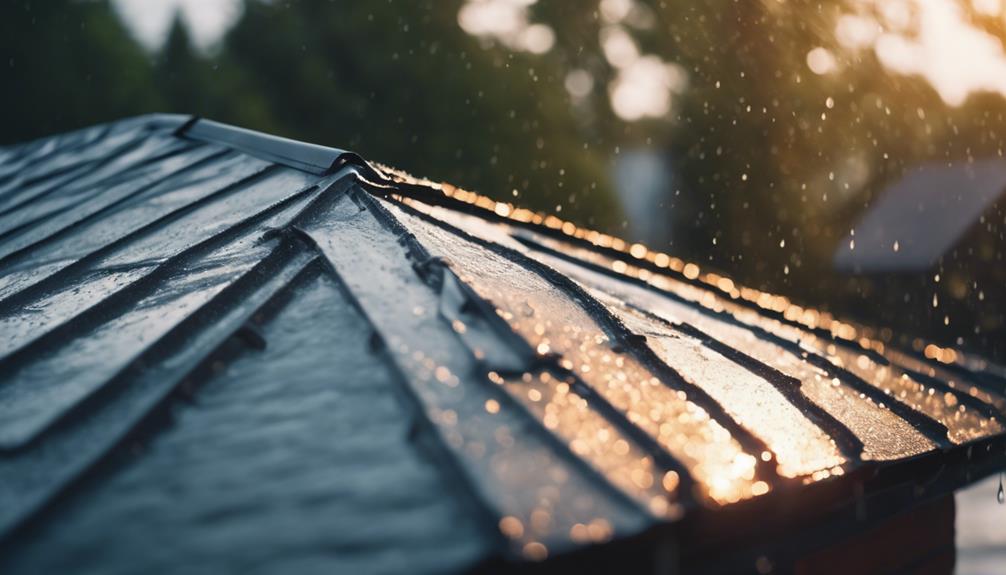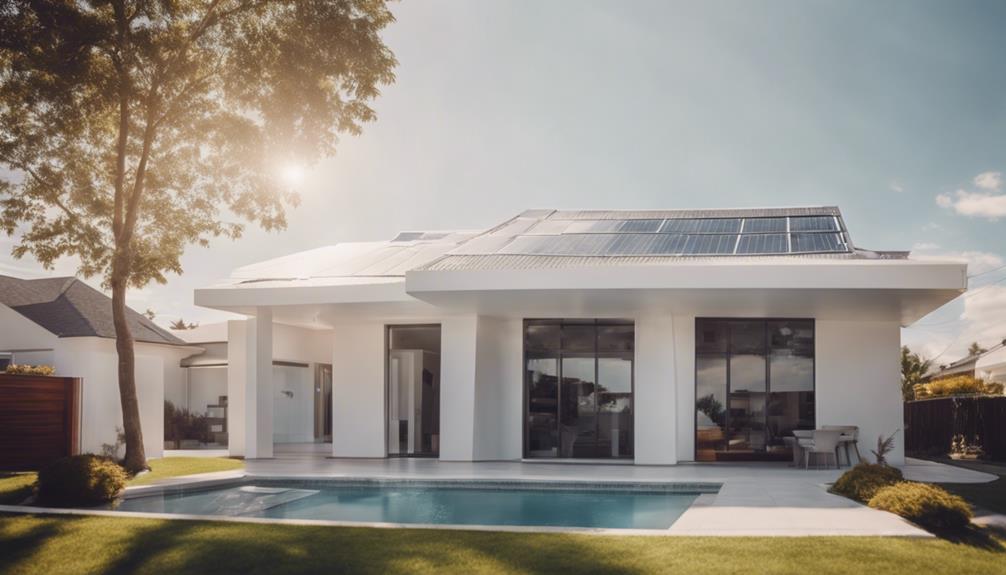What are the Advantages of Choosing a Fibreglass Roof?
Uncover the surprising "T" benefit of fiberglass roofs that can save you money in the long run.
Fibreglass roofs have gained popularity in the construction industry due to their numerous benefits. From their exceptional durability to their lightweight nature, fibreglass roofs offer a range of advantages that make them a preferred choice for many homeowners and businesses alike.
Their resilience to various weather conditions and their cost-effectiveness compared to other roofing materials make them a compelling option. However, there is one key benefit of fibreglass roofs that often goes unnoticed but can have a significant impact on long-term maintenance costs.
What Factors Influence the Durability of a Fibreglass Roof?
Fibreglass roofs are renowned for their exceptional longevity and resistance to various environmental factors, making them a highly durable roofing option for both residential and commercial properties. The durability of fibreglass roofs stems from the material’s innate properties.
Fibreglass is highly resistant to corrosion, rust, and rot, which are common issues that plague other roofing materials over time. This resistance allows fibreglass roofs to maintain their structural integrity and appearance over an extended period, reducing the need for frequent repairs or replacements.
Additionally, fibreglass roofs are also known for their high impact resistance, and ability to withstand hail, fallen branches, and other debris without sustaining significant damage. This feature contributes to the overall durability of fibreglass roofs, ensuring that they can withstand harsh weather conditions and external pressures without compromising their performance.
What Factors Contribute to the Lightweight Nature of Fibreglass Roofs?
The lightweight nature of a fibreglass roof contributes considerably to its practicality and ease of installation in various construction projects. Here are three key benefits of the lightweight nature of fibreglass roofs:
- Ease of Handling: Fibreglass roofs are notably lighter than traditional roofing materials such as asphalt shingles or metal. This lightweight characteristic makes it easier for construction workers to transport and manoeuvre the roofing material around the job site.
- Reduced Structural Stress: The lightweight nature of fibreglass roofs puts less strain on the overall structure of a building. This can be particularly advantageous for older buildings or structures where heavy roofing materials may pose a risk of causing structural damage over time.
- Quick Installation: Due to its lightweight properties, fibreglass roofs can be installed more quickly compared to heavier roofing materials. This can help reduce labour costs and shorten the overall construction timeline, making fibreglass roofs a practical choice for various construction projects.
What Makes Fibreglass Roofs Resistant to Various Weather Conditions?

With their exceptional durability and resilience, fibreglass roofs exhibit remarkable resistance to various weather conditions, making them a reliable choice for protecting buildings against the elements. Fibreglass roofs are known for their ability to withstand harsh weather such as heavy rain, snow, hail, and strong winds. Unlike some traditional roofing materials that may deteriorate or get damaged over time due to exposure to extreme weather, fibreglass roofs maintain their structural integrity and performance.
One key factor contributing to the weather resistance of fibreglass roofs is their non-porous surface. This characteristic prevents water from seeping into the roofing material, reducing the risk of leaks, mould, and rot. Additionally, fibreglass roofs have a high resistance to UV rays, making them less prone to fading or becoming brittle under prolonged sun exposure.
What Are the Advantages of Fibreglass Roofing Over Other Roofing Materials?
When considering roofing materials for a building, it is imperative to assess their advantages over other options to make an informed decision based on factors such as durability, performance, and cost-effectiveness. Fibreglass roofs offer several key advantages over other roofing materials:
- Durability: Fibreglass roofs are known for their exceptional durability, with the ability to withstand harsh weather conditions such as heavy rain, strong winds, and even hail. This durability guarantees that fibreglass roofs have a longer lifespan compared to many other roofing materials.
- Lightweight: Fibreglass roofing materials are lightweight, making them easier to install and reducing the structural load on the building. This lightweight nature also makes fibreglass roofs a suitable option for a wide range of architectural designs.
- Low Maintenance: Fibreglass roofs require minimal maintenance compared to traditional roofing materials like asphalt shingles or metal roofs. This low maintenance requirement translates to cost savings over the lifespan of the roof, making fibreglass a cost-effective choice for many building owners.
How Can Fibreglass Roofing Contribute to Long-Term Cost Savings?

Fibreglass roofs offer building owners notable long-term cost savings due to their low maintenance requirements and extended lifespan compared to traditional roofing materials. The durability of fibreglass roofs guarantees that they require minimal upkeep over the years, reducing the need for frequent repairs or replacements that can incur substantial costs.
Additionally, fibreglass roofs are highly resistant to common roofing issues such as leaks, cracks, and corrosion, further contributing to their cost-effectiveness in the long run. Furthermore, the extended lifespan of fibreglass roofs notably reduces the frequency of roof replacements, saving building owners both time and money.
With proper installation and regular inspections to address any potential issues promptly, fibreglass roofs can last for several decades, outlasting many traditional roofing materials. This longevity not only minimizes the expenses associated with frequent roof replacements but also provides peace of mind to building owners knowing that their investment in a fibreglass roof will continue to pay off over time.
Frequently Asked Questions
How Does a Fibreglass Roof Compare to Traditional Asphalt Shingles in Terms of Installation Process and Time Required?
Regarding the installation process and time required, fibreglass roofs provide a quicker and simpler installation compared to traditional asphalt shingles. The lightweight nature of fibreglass makes it easier to handle and install efficiently, reducing overall installation time.
Are There Any Specific Maintenance Requirements or Precautions Homeowners Should Take to Prolong the Lifespan of a Fibreglass Roof?
To prolong the lifespan of a fibreglass roof, homeowners should conduct regular inspections for damages, clean debris and maintain gutters, trim nearby trees to prevent branches from damaging the roof and guarantee proper ventilation to prevent moisture buildup.
Can a Fibreglass Roof Be Customized in Terms of Color or Style to Match the Aesthetic of Different Types of Homes?
Yes, fibreglass roofs can be customized in various colours and styles to match different home aesthetics. This flexibility allows homeowners to choose options that complement their property’s design, enhancing curb appeal while benefiting from the durability of fibreglass material.
What Are the Environmental Benefits of Choosing a Fibreglass Roof Over Other Roofing Materials, Such as Its Recyclability or Energy Efficiency?
Fibreglass roofs offer environmental benefits through their recyclability and energy efficiency. Fibreglass can be recycled at the end of its life, reducing waste. Additionally, its reflective properties can enhance energy efficiency by reducing cooling needs in buildings.
Are There Any Common Misconceptions or Myths About Fibreglass Roofs That Homeowners Should Be Aware of Before Making a Decision?
Before deciding on a fibreglass roof, homeowners should be aware of common misconceptions. Some may believe fibreglass roofs are easily damaged or prone to leaking. However, when properly installed and maintained, fibreglass roofs can be durable and reliable.